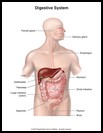
Hepatitis A
What is hepatitis A?
Hepatitis A is a viral infection of the liver. The liver becomes inflamed, tender, and swollen.
How does it occur?
Hepatitis A is caused by the hepatitis A virus. The virus can be spread by contact with infected bowel movements. An infected person may pass hepatitis A to others by not washing his or her hands, especially after using the bathroom. Your child might get the virus from:
- food handled by an infected person
- water contaminated with sewage
- shellfish taken from contaminated waters.
What are the symptoms?
Symptoms usually appear 2 to 6 weeks after your child is infected with the virus. Hepatitis A is sometimes so mild, especially in children, that there are few or no obvious symptoms.
If your child has symptoms, the illness usually begins with:
- loss of appetite
- fever
- general aching
- tiredness.
After several days there may be:
- nausea and vomiting
- dark brown urine
- yellowish skin and eyes (jaundice)
- pain just below the ribs on the right side, especially if you press on that part of the abdomen
- bowel movements that are whitish or light yellow and may be looser than normal.
How is it diagnosed?
Your child's healthcare provider will ask about your child's medical history and symptoms. The provider will examine your child's skin and eyes for signs of hepatitis and will check the abdomen to see if the liver is enlarged or tender.
Your child will have blood tests. If blood tests show that the liver is not working normally, the healthcare provider will do tests to find out what type of virus is causing the problems. Tests that find a virus will also determine the type of virus. (Several types of viruses can cause hepatitis.)
How is it treated?
The usual treatment is rest. Very few children ever need to be hospitalized for hepatitis A.
Antibiotics are not useful in treating hepatitis A.
How long will the effects last?
Recovery from hepatitis A usually takes 4 to 8 weeks. The disease rarely has lasting effects such as permanent liver damage.
Hepatitis that lasts more than 6 months usually isn't caused by hepatitis A infection.
How can I take care of my child?
- Follow the healthcare provider's instructions for taking medicine to relieve the symptoms. Your child should avoid taking certain medicines that can further damage the liver (for example, acetaminophen). Ask your healthcare provider which medicines can be safely taken for symptoms (such as itching and nausea).
- Follow your healthcare provider's advice for how much rest your child needs and when he or she can return to normal activities, including school or work. As the symptoms improve, your child may gradually increase the level of activity. It is best to avoid too much physical exertion until your child's healthcare provider tells you it's OK.
- Your child may feel nauseated and may not want to eat. It is best for your child to eat small, high-protein, high-calorie meals. Soft drinks, juices, and hard candy may be less nauseating for your child.
What can be done to help prevent hepatitis A?
Hepatitis A can be spread only by people with active infections. It is usually contagious for 2 to 3 weeks before symptoms appear and for 2 to 3 weeks afterward. During this time, others can pick up the virus by touching anything contaminated with bowel movements of the infected person.
A vaccine is available to prevent hepatitis A. Two shots are given at least 6 months apart. The risk for hepatitis A is higher if:
- Travel or work in a developing country is planned.
- You live in an area that has outbreaks of hepatitis A.
- Your child has chronic liver disease.
- Your child receives clotting factor concentrates for a clotting disorder such as hemophilia.
The HAV vaccine is recommended for all children over one year of age. If you are traveling outside of the US, the HAV vaccine is very important. It is best to be completely vaccinated against hepatitis A before you or your child travels. This means getting the first shot at least 7 months before traveling. If you don't have that much time before you leave, it is still important for you and your child to get at least one shot 2 weeks or more before your trip.
An injection of immune (gamma) globulin is usually given right after your child has been exposed to contaminated food or have had contact with an infected person. Immune globulin may not always prevent hepatitis A, but it may make it milder. The protection begins almost immediately but it lasts for just 2 to 4 months.
If your child has an active hepatitis A infection, it is very important to make sure he always washes his hands thoroughly after using the restroom. This will help prevent spread of the disease to others.
If someone in your household has hepatitis, take the following precautions:
- Ask your healthcare provider if you need to get a hepatitis or gamma globulin shot.
- Wear disposable gloves if you must have contact with the sick person's bowel movements or body fluids.
- Wash the infected person's clothing and bed linens separately from other laundry. Use very hot water and a strong detergent.
- Clean contaminated toilets and other bathroom surfaces with a disinfectant. Wear gloves when you clean. If possible, it's safest to have the infected person use a different bathroom from everyone else in the household.
For more information, call or write:
American Liver Foundation
75 Maiden Lane, Suite 603
New York, NY 10038
800-GOLIVER (465-4837)
973-256-2550
Web site: http://www.liverfoundation.org
Printed information about liver disease and hepatitis, information specialists

